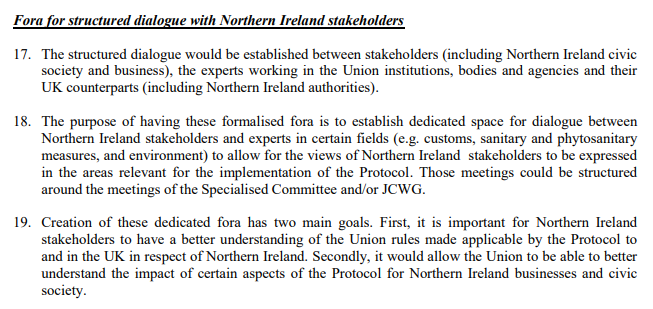
In briefing-world Brexit Northern Ireland is on the verge of collapse due to the imposition of the European Court of Justice, and the EU has just put forward remarkable proposals to sweep away nearly all checks under the protocol.
Fine. Except neither of these things is true.
Fine. Except neither of these things is true.
Great Britain to Northern Ireland goods movements are largely continuing, though there's no doubt with greater costs and paperwork for which business has suggested fixes. Unionist anger at a protocol they opposed is real, though also inflamed by the UK government.
The EU has responded with limited proposals to meet the problems identified by Northern Ireland business, while claiming unconvincingly that these will sweep away enormous amounts of checks, and that Member States are strongly resisting any flexibility.
I might be more inclined to take the EU briefing seriously if I hadn't spent three years of my working life hearing about far reaching proposals that turned out in reality to be rather limited. It is totally in line with the usual modus operandi of the Commission.
The coming weeks of UK-EU talk over the Northern Ireland protocol will be a tedious and largely meaningless conflation of briefing and reality. The UK will at some point claim the EU proposals didn't meet the hype. The EU will claim the UK aren't engaging properly.
Meanwhile as has already happened the UK will continue to think the Commission only respond to threats, even though their proposals are a routine part of trade relations, and even after the UK decides the proposals did not in fact meet the hype.
And in the end, as has always been the case with Northern Ireland and Brexit, the UK government will have to decide between settling or going into economic conflict with EU and diplomatic battle with US. They have always previously settled, to return to the issue later.
Whether there is a Northern Ireland protocol settlement this year, or Article 16 leads us towards trade conflict, the issue will not be actually resolved, because there is a fundamental conflict between multiple players. At best its instability can be managed with care.
So Brexit is back, but it is never going to go away. You can't actually ignore 50% of our trade, our neighbouring continent, or the impact on Northern Ireland. We could however do a way better job on understanding what is actually happening.
• • •
Missing some Tweet in this thread? You can try to
force a refresh






